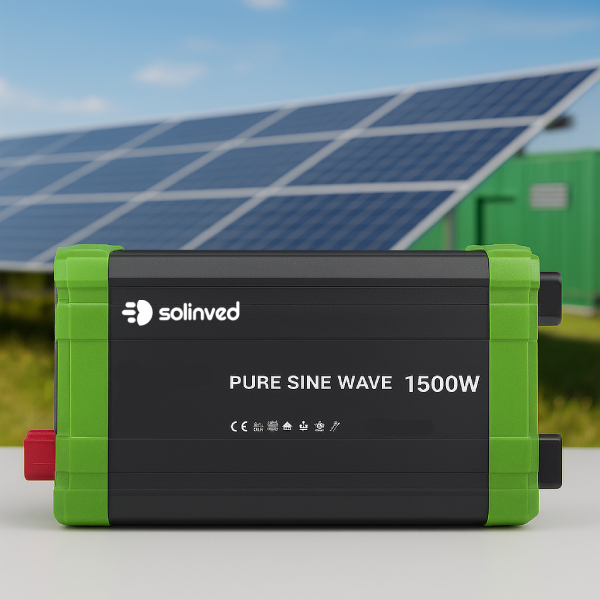


Inverters are one of the most important components at the heart of solar energy systems. Inverters convert direct current (DC) from solar panels into alternating current (AC), making them suitable for use in homes, businesses, and industrial facilities. However, not all inverters are the same.
There are different types of inverters depending on the application area, energy needs, and system structure. Solinved provides maximum efficiency, safety, and durability with its on-grid, off-grid, and hybrid inverter solutions developed for systems of varying sizes.
In this article, we will examine inverter types, their operating principles, and the applications they are used in, along with Solinved's innovative energy solutions.
An inverter is a device that converts DC electricity from solar panels into AC electricity used in homes and businesses. This allows the energy generated from the panels to be used directly, transferred to the grid, or stored in batteries.
Modern inverters not only perform energy conversion;
Monitors system performance,
Optimizes energy production,
Detects fault conditions,
Offers remote control.
Solinved inverters maximize energy production from panels thanks to MPPT (Maximum Power Point Tracking) technology.
Inverters used in solar energy systems are generally divided into three main categories:
This type of inverter operates integrated with the grid. The energy from the solar panels is converted to AC by the inverter and transferred to the grid.
Operating Principle:
The energy produced during the day is primarily used in the building.
If there is excess energy, it can be sold back to the grid (through a net metering system).
The system also shuts down when the grid power is cut off (for safety reasons).
Areas of Use:
Home-type solar energy systems
Offices and commercial establishments
Projects that sell energy to the grid
Solinved Solutions:
Solinved's on-grid inverters stand out with their high-efficiency MPPT modules, remote monitoring features, and low-loss energy conversion.
Off-grid inverters are used to generate energy in areas where there is no grid connection. The energy generated in these systems is stored in batteries and used when needed.
Operating Principle:
The energy from the panels is converted from DC to AC by the inverter.
Excess energy is stored in lithium batteries.
The energy in the batteries is used at night or on sunny days.
Areas of Use:
Rural areas, mountain chalets, and camping areas
Farmlands far from the power grid
Solar irrigation systems
Telecom and security infrastructures
Solinved Solutions:
Solinved off-grid inverters provide uninterrupted power with their high energy storage compatibility and smart charge control system. They are also optimized for solar drives and agricultural applications.
Hybrid inverters combine the features of on-grid and off-grid systems. They can operate both integrated with the grid and provide uninterrupted power with battery backup.
Operating Principle:
Energy generated during the day is first used in the building.
Excess energy is stored in batteries.
When the grid goes out, the system automatically switches to battery power.
MPPT technology achieves maximum efficiency.
Areas of Use:
Home and villa systems
Small businesses and offices
Areas with frequent power outages
Backup energy support in industrial facilities
Electric vehicle charging systems
Solinved Solutions:
Solinved hybrid inverters offer smart energy management, remote monitoring, and full control with lithium battery integration.
Additionally, Solinved Charge provides energy storage and inverter integration in electric vehicle charging systems.
Panel-based energy management is achieved using separate inverters for each panel.
Advantage: Shading or panel failure does not affect the entire system.
Application: Small-scale rooftop systems, apartment projects.
Converts DC batteries to AC in portable energy systems.
Application: Caravans, boats, mobile energy solutions.
System Capacity: The inverter's power should be compatible with the panel capacity.
Efficiency Rate: MPPT-supported inverters should be preferred.
Energy Storage Compatibility: Inverters with battery integration are more flexible.
Remote Monitoring: Performance monitoring and fault management are easier.
Brand Assurance and Service Network: Preference should be given to brands like Solinved that provide domestic production and technical support.
Up to 98% Efficiency: Maximum energy conversion with MPPT technology.
Remote Monitoring: Performance control via mobile and web interfaces.
Full Integration: Full compatibility with solar panels, batteries, solar drivers, and charging systems.
Safe Operation: Overvoltage, short-circuit, and temperature protection.
High Durability: Long-lasting design at industrial standards.
Domestic Production Support: Fast service and spare parts availability with inverters manufactured in Turkey.
Solinved inverter solutions are designed for projects of all sizes:
| Application Area | Suitable Inverter Type | Solinved Solution |
|---|---|---|
| Home Systems | On-Grid/Hybrid | Solinved Mono-Phase Inverter |
| Commercial Facilities | On-Grid/Hybrid | Solinved Three-Phase Inverter |
| Industrial Facilities | Hybrid | Solinved Smart Inverter Series |
| Agricultural Irrigation | Off-Grid | Solinved Solar Drive Integrated Inverter |
| Electric Vehicle Charging | Hybrid | Solinved Charge Integration |
| Remote Areas | Off-Grid | Solinved Battery-Backed Systems |
Solinved develops inverter technologies not only for energy conversion but also for smart energy management.
With next-generation inverter systems:
Energy production is monitored in real time,
Excess energy is stored in batteries,
Energy continuity is ensured with off-grid systems.
Solinved's goal is not only to generate energy, but also to manage it intelligently, offering users complete independence.
1. Which type of inverter is the most efficient?
It varies depending on the application. Hybrid inverters are the most efficient option for systems requiring energy storage.
2. What is the difference between on-grid and off-grid?
On-grid systems are connected to the grid, while off-grid systems operate completely independently.
3. Are Solinved inverters battery-compatible?
Yes, all hybrid and off-grid models are fully compatible with lithium battery systems.
4. Which inverters are used in agricultural systems?
Off-grid inverters, combined with solar inverters, provide energy-efficient irrigation.
5. What is the lifespan of Solinved inverters?
With regular maintenance, they can operate reliably for 10–15 years.